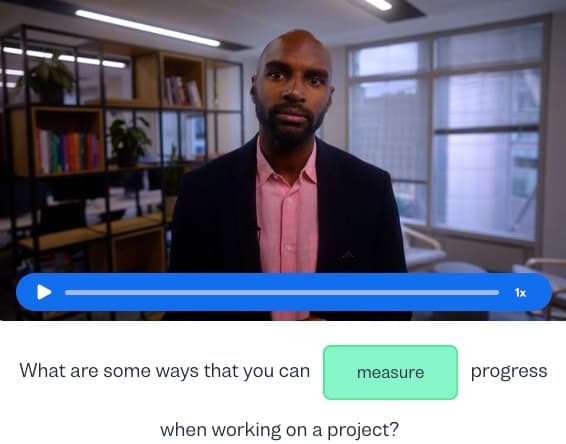I want to learn...
We mortals struggle to master languages. But there are some superhumans — polyglots — who are fluent in at least five languages. The thing is, they’re not really superhuman. Nothing is stopping you and me from learning five or more languages. We all have the ability to do it. But polyglots do share a few things in common.
Read on to find out what makes polyglots so special and how you can apply their methods to your language learning.
Curious to know how polyglots learn a new language?
Learning a new language is like embarking on a new project while measuring your progress. This is just one of the many ways that polyglots do to stay focused when learning many languages. Learn a new language via Busuu’s free online courses and learning resources!
What are polyglots?
Polyglots are people fluent in five or more languages. Yes, you read that right — fluent in five languages. Monolinguals are fluent in one. Bilinguals in two. And multilinguals in three or four languages (check out our article on the differences between bilinguals, trilinguals and polyglots). Being bilingual is a huge achievement that many people never reach. Being a polyglot is something else.
They’ve mastered learning languages. Most importantly of all, they enjoy doing it. It’s a fun and interesting challenge for them.
Can anyone be a polyglot?
Anyone can become a polyglot. Because polyglots are people who love learning languages. They love the challenge. And, importantly, they love the process. They aren’t geniuses. They aren’t born with extra language-learning genes.
They’re people like me and you who enjoy learning languages. They work hard. And they’re patient. As long as you like learning languages, enjoy challenging processes, and have the dedication to keep learning, you can become a polyglot too.
For example, read about Caleb. He’s only 9 years old but already knows three languages. He isn’t a polyglot yet. But he’s on track to being a polyglot because he loves learning languages.
Language learning tips from the best
Let’s break down why polyglots are so successful at learning languages. There’s nothing superhuman about these techniques. Everything they do is 100% applicable to your language learning. Here are eight top tips from polyglots.
1. Personalize your learning
Everyone has their own method of learning and polyglots know this better than anyone. Instead of sticking to the tried and true language learning methods like most people do, they figure out what works best for them.
Some polyglots start speaking from day one. Others fly through textbooks first. And others learn by reading as much as possible in the target language. Of course, at this stage, they can’t understand much. But that doesn’t stop them.
Through trial and error to find out what works for them. And then they stick to it until they start seeing results.
Takeaway: When you’re starting a new language, you don’t have to learn the way everyone else learns. Personalize your learning. Relate it to your hobbies, interests, or anything you're passionate about. Then test, refine, and test again until you figure out the best way for you to learn a language.
2. Focus on communication (not grammar)
Polyglots all have their own way of learning. But one thing they share in common is a focus on communication. Grammar is a tool to aid in their communication. It isn’t the focus of their studies.
They focus on speaking, listening, reading, and writing. The four communication skills.
Takeaway: Find ways to practice communication skills. You can find a native speaker to talk to. Or you could write a diary. There are hundreds of ways to practice communication skills — find the ones that work for you.
3. Use your new language
That’s not to say that they don’t learn vocabulary and grammar because of course they do. But they don’t memorize phrases or structures for the sake of it. They use what they learn. They apply their new knowledge as soon as possible.
Takeaway: It’s not enough to spend 10 minutes per day memorizing vocabulary on a mobile app. You need to find ways to use the words you learn (read on the next tip…)
4. Speak as much as you can
Alright, I know — technically this (and the next point) are the same as above. But, they’re important so they deserve repeating.
Polyglots speak a lot early in their language journey. It doesn’t matter that they can only say simple things or that they make mistakes. They understand that’s part of the journey. They take every opportunity to practice speaking.
Takeaway: Get speaking as soon as possible. Don’t wait. Take every chance you have to practice speaking your new language. Forget making mistakes — just talk. Mistakes will happen. But that’s when the best learning happens.
5. Listen and read as much as you can
Comprehensible input is one of the keys to learning a language. It leads to indirect language learning and best of all anyone can get it. Here’s how.
Comprehensible input is input at or slightly above your current proficiency level. It’s easy to understand. You don’t need to think too deeply or constantly have your head in your dictionary. You get through content at a fast rate because of this. You’re more likely to see the same grammar structures and words over and over again.
As you see the same words and grammar forms pop up in the comprehensible input, you learn them without studying them. You can see why this is such a popular method with polyglots. They read (easy) books or listen to (easy) podcasts and learn language without “studying.”
Takeaway: Dust off your graded readers, download your favorite easy-to-listen-to podcast, and get some sweet indirect language gains. Make sure you choose interesting topics for the best results. The combination of easy-to-understand and interesting is powerful in language learning. You’ll be able to fly through the content and you’ll enjoy every second of it.
6. Do little but do it often
Habit building is important for your studies. It needs to be sustainable or it’s too easy to find excuses not to study. This is another thing polyglots know well. So they create simple routines that are easy to stick to.
For example, study for 30 minutes a day (it doesn’t even need to be in one block). 30 minutes each day is easier to stick to than 3 hours on Saturday. By reducing barriers to studying, polyglots build habits they stick to.
Takeaway: Instead of cramming, study a little but often. 10, 20, 30, 40 minutes a day — whatever works for you and you’re confident you can stick to. Learning a language is a long process. Build habits that last the whole journey by starting small and simple.
7. Stay the course
Learning a language is a long and challenging process. It doesn’t happen overnight. Polyglots love the challenge of learning a language and they stay the course — right to the end. They don’t cut corners. They spend hours and hours studying and practicing their new language.
There’s no magic involved in their processes. They figure out what works for them, and then they do a lot of it for as long as it takes. What we can all learn from polyglots is the magic of hard work and not giving up.
Takeaway: Be prepared for a long and challenging journey learning your new language. It isn’t easy but don’t take shortcuts. Find what works for you and do it over and over again. Language learning often involves setbacks. Don’t let them derail your practice. Embrace the difficulties and failures and use them as a springboard to learn. This dedication is what really sets polyglots apart from the rest of us.
8. Meet other polyglots
There are so many language learning methods that it’s difficult to know where to start. Luckily, polyglots are a helpful (and sociable) bunch. Polyglot meetups are common around the world. At these social events, polyglots share language learning techniques. They give each other tips. They learn languages together.
Takeaway: Learning a language is a social activity. You need to talk to native speakers in your new language. But it’s also helpful to talk to other language learners about language learning. There’s a lot of wisdom and experience out there. Ask questions, get to know people, and apply what you learn to your own language learning. You can do this when you join Busuu and meet fellow language learners and native speakers in the Busuu community who can help you on your way to becoming a polyglot and speak multiple languages with them!
Take inspiration from polyglots
So there you have it. Apply these eight tips from language-learning masters to your own study. Find what works for you, build good habits, and focus on communication. These are the keys to mastering a language.
Learn all the languages you want with Busuu!
Even people who aren’t lucky enough to get a bilingual education can master a new language with Busuu. You get access to free online courses and connect with a community of fellow language learners! So what are you waiting for? Jumpstart your language learning journey today and learn a language or two with Busuu!
AUTHOR

Barney Meekin
Newlanguages


